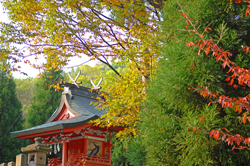大長谷若建命(おおはつせのわかたけるのみこと・雄略天皇)が、泊瀬(はつせ)にある大きなケヤキの木の下で、新嘗祭(にいなめさい)という収穫祭の宴会をもうけた時のことです。
伊勢の国から宮につかえていた采女(うねめ)が、天皇に杯をささげようとした時、ケヤキの葉が杯の中に落ちてきました。ですが采女は、落ち葉が杯に浮かんでいることに気づかず、天皇に献上しました。
それを見て怒った天皇は、たちまち采女を打ちふせ、刃を首に当てて、今にも首を落とそうとします。すると采女は「どうか殺さないでください、申し上げたいことがございます」と言い、静かに、歌をよみました。
杯に浮かんだケヤキの葉を、国土がつくられた神話に出てくる「浮いた脂」に見立てて、縁起の良いことをことほぐ歌を作ったのです。この歌を聞き、天皇は采女を許したといいます。
雄略天皇といえば、『日本書紀』には、「大悪天皇」とまで呼ばれるほど残忍な性格であったと記されていますが、このエピソードでは、相手を許す心の広い一面も見られます。それにしても、とっさの行動で命の危険を逃れた采女の機転は、現代の私たちも大いに学ぶべきものでしょう。
英訳文を表示する(For English)
Episode 13:
A Song that Saved Her Life
From the Kojiki, Volume III
“Kanasuki-no-oka, Momoetsuki in Hatsuse”
Ohatsuse-no-Wakatakeru-no-mikoto (Emperor Yuryaku) held a Niiname-sai, a festival to celebrate the new harvest, under a tall zelkova tree in Hatsuse (now Sakurai City, Nara Prefecture). When a lady-in-waiting from Ise Province (now Mie Prefecture) poured sake for Emperor Yuryaku, a zelkova leaf dropped into his cup. Not having noticed the fallen leaf floating in the cup, she served sake to the emperor. Seeing the leaf, he became so angry that he threw her down instantly, put his sword to her neck, and was about to cut off her head. Then she said, "Please do not kill me. I would like to tell you something," and composed a poem, with the following meaning:
"Makimuku-no-Hishiro-no-miya is an auspicious palace illuminated by the shining morning sun and the brilliant setting sun. This palace is built firmly, like bamboos and trees with their roots spreading deep into the ground. This palace where the Niiname Festival is being held, has a tall zelkova tree with graceful branches. The upper branches cover the sky, the middle branches cover the eastern provinces, and the bottom branches cover the western provinces of the country. The leaf of the upper branch fell to the middle branch, a leaf of the middle branch fell to the bottom branch. The leaf from the bottom branch fell into the cup I served Your Majesty, and floated like a lump of fat on the water..."
The lady-in-waiting composed this poem expressing good fortune, in the way the zelkova leaf floating in the cup resembled "the lump of fat" that appears in Japan’s creation myth.
After hearing this song, Emperor Yuryaku forgave her.
In the Nihonshoki (The Chronicles of Japan) it is said that Emperor Yuryaku was called the “Evil Emperor” because of his cruelty; however, this episode shows another side, that of a generous personality, capable of forgiveness. Even so, we should learn from the quick-thinking and diplomatic response of the lady-in-waiting that enabled her to escape with her life.
Related tourism site:
Shirayama Shrine(Kurozaki, Sakurai City)
According to the Kojiki, the palace of Wakatakeru-no-mikoto (Emperor Yuryaku) was located in Hatsuse; however, a kinsakumei tekken (iron sword with gold inlay) unearthed from the Inariyama burial mound in Saitama Prefecture indicates that his palace was in Shiki. Shirayama Shrine is one of the proposed sites, but there are still more potential sites in the surrounding area.
